- Home
- Muriel Spark
The Complete Short Stories Page 6
The Complete Short Stories Read online
Page 6
It was a year later that Ralph felt a crisis in his work. His books were selling, but on the other hand they were not taken seriously enough by serious people. All his novels had ended happily. He decided to write a tragedy.
He ranged his experience for a tragedy. He thought of, and rejected as too banal, the domestic ruptures of his friends past and present. He rejected the story of his mother, widowed young, disappointed in her son, but still pushing on: that was too personal. He thought of Daphne. That might lead to something both exotic and tragic. He recalled her stories of Old Tuys and Chakata, the theme of the lifelong feud. He took a ticket on a plane to the Colony in order to obtain background material at first hand.
Almost immediately he arrived in the Colony he found himself beset by admirers. He had never before been so celebrated and popular in his person. He was invited to Government House. Dinners were given in his honour, and people drove in through swollen rivers from outlying districts to attend them. He had to pick and choose amongst the invitations he received. Everyone with a white skin had heard of, if they had not read, Ralph Mercer. Moreover, seated among this company on wide verandas after dinner he could look round without catching the cool eye of some critic, some frightful man whom the public hardly ever heard of, but who, at home, was always present at parties of this sort, and who put Ralph out. He began to think he had vastly underrated the intelligence of his public.
‘I have been thinking of changing my style. I’ve been thinking of writing a tragedy.’
‘Good Lord,’ said the retired brigadier whom he had addressed, ‘you don’t want to do that.’
Everyone said the same.
Another thing everyone said was, ‘Why don’t you settle here?’ or ‘Why don’t you take a place and live here for part of the year? It’s the only way to avoid the heavy taxes.
At the Club he had met Michael Casse who had come up to the Capital to see the Land Bank about a loan.
‘My wife adores your books,’ said Michael. He giggled. Ralph wondered for a moment if Michael was a critic.
‘We have a mutual friend,’ said Michael, ‘or rather had. Daphne du Toit. I went to her funeral.’ He giggled.
‘The reason I’ve come out here is to see her grave,’ said Ralph defensively. ‘And to talk to her uncle.’
‘Got a car?’ said Michael. ‘If not I’ll drive you down. I live near them.’ Ralph realized that Michael’s giggle was a nervous tic.
‘I might settle in the Colony — seven months in the year, you know,’ he confided.
‘There’s a nice place near us,’ said Michael. ‘It’s coming up for sale soon.
Ralph had been two months in the Colony, had toured the country, had been shown all the interesting spots, and met the enjoyable people, when at last he accepted Michael’s invitation to stay at his farm.
‘Are you writing anything at the moment?’ said Michael’s wife.
‘No, but I’m collecting material.’
‘Oh, will it be about the Colony?’
‘It’s difficult to say.’
He was not sure now that the Daphne idea would be as appealing as he had thought. He could not envisage his public, especially that section which he had recently met at dose quarters, appreciating such a theme.
Michael showed him over the farm which was up for sale. Ralph said he would almost certainly take it.
They went to see Chakata and Ralph spoke of Daphne. Chakata said, ‘Why didn’t she settle down in England? Why did she come back?’
‘I suppose she wanted to,’ said Michael, and giggled.
Chakata spoke of his rheumatism. He hobbled out on the stoep and called for drinks. As they followed, Ralph noticed a lanky old man seated in the corner, muttering to himself.
He inquired of Chakata. ‘Is that Mr Tuys? Daphne told me about Mr Tuys.’
Chakata said, ‘Bad year for maize. I shan’t live long.’
Michael drove Ralph down to the cemetery. His wife had suggested:
‘Leave him alone for a while in the cemetery. I think he was in love with the girl.’ Michael respected his wife’s delicacy. He giggled, left Ralph at the graveside, and explaining that he had some errands to do in the village, said he would be back by and by.
‘You won’t be long,’ said Ralph, ‘will you?’
‘Oh no,’ said Michael.
‘There seem to be a lot of mosquitoes about here. Is it a fever area?’
‘Oh no.’ He giggled and went.
After Ralph had looked at the inscription, ‘Daphne du Toit, 1922—1950, he walked up and down. He looked blankly at the gravestones and noticed one inscribed ‘Donald Cloete’. This name seemed familiar, but he could not remember in what way. Perhaps it was someone Daphne had talked about.
‘Go’way, go’way.’
That was the bird, just behind Daphne’s grave. She had often mentioned the bird.
‘It says go’way, go’way.
‘Well, what about it?’ he had said to her irritably, for sometimes she had appeared to him, as in a revelation, a personified Stupidity.
She would tell him, ‘There’s a bird that says “Go’way, go’way”,’ without connecting the information with any particular event; she would expect him to be interested, as if he were an ornithologist, not an author.
‘Go’way, go’way,’ said the bird behind Daphne’s grave.
He heard the bird at some time during each day for the next six weeks while he was completing his tour of the rural spaces. He was glad to return to the Capital, and to be free of its voice. Relaxing in the Club, it was as though the bird had never existed.
However, he went with the Governor for a round of golf:
‘Go’way. Go’way …’
He booked a seat on the plane to England for the following week. He met Michael once more by chance at Williams Hotel.
‘That farm,’ said Michael ‘— someone else has made an offer. You’d better settle right away.’
‘I don’t want it,’ said Ralph. ‘I don’t want to stay here.’ They sat on the stoep drinking highballs. Beyond the mosquito netting was the bird.
‘Can you hear that go-away bird?’ said Ralph. Michael listened obediently.
‘No, I can’t say I can.’ He giggled, and Ralph wanted to hit him.
‘I hear it everywhere,’ said Ralph. ‘I don’t like it. That’s why I’m going.’
‘Good Lord. Keen on bird life, are you?’
‘No, not particularly.’
‘Ralph Mercer isn’t going to buy the farm,’ Michael told his wife that evening.
‘I thought it was settled.’
‘No, he’s going home. He isn’t coming back. He says he doesn’t like the birds here.’
‘I wish you could cure that giggle, Michael. What did you say he doesn’t like?’
‘The birds.’
‘Birds. Is he an ornithologist then?’
‘No, I think he’s RC.’
‘A man, darling, who studies birds.’
‘Oh! Well, no, he said no, he’s not particularly interested in birds.’
‘How extraordinary,’ she said.
The Curtain Blown by the Breeze
It is always when a curtain at an open window flutters in the breeze that I think of that frail white curtain, a piece of fine gauze, which was drawn across the bedroom windows of Mrs Van der Merwe. I never saw the original curtains, which were so carelessly arranged as to leave a gap through which that piccanin of twelve had peeped, one night three years before, and had watched Mrs Van der Merwe suckle her child, and been caught and shot dead by Jannie, her husband. The original curtains had now been replaced by this more delicate stuff, and the husband’s sentence still had five years to run, and meanwhile Mrs Van der Merwe was changing her character.
She stopped slouching; she lost the lanky, sullen look of a smallholder’s wife; she cleared the old petrol cans out of the yard, and that was only a start; she became a tall lighthouse sending out kindly beams which some took for welc
ome instead of warnings against the rocks. She bought the best china, stopped keeping pound notes stuffed in a stocking, called herself Sonia instead of Sonji, and entertained.
This was a territory where you could not bathe in the gentlest stream but a germ from the water entered your kidneys and blighted your body for life; where you could not go for a walk before six in the evening without returning crazed by the sun; and in this remote part of the territory, largely occupied by poor whites amidst the overwhelming natural growth of natives, a young spinster could not keep a cat for a pet but it would be one day captured and pitifully shaved by the local white bachelors for fun; it was a place where the tall grass was dangerous from snakes and the floors dangerous from scorpions. The white people seized on the slightest word, Nature took the lightest footfall, with fanatical seriousness. The English nurses discovered that they could not sit next a man at dinner and be agreeable — perhaps asking him, so as to slice up the boredom, to tell them all the story of his life — without his taking it for a great flirtation and turning up next day after breakfast for the love affair; it was a place where there was never a breath of breeze except in the season of storms and where the curtains in the windows never moved in the breeze unless a storm was to follow.
The English nurses were often advised to put in for transfers to another district.
‘It’s so much brighter in the north. Towns, life. Civilization, shops. Much cooler — you see, it’s high up there in the north. The races.’
‘You would like it in the east — those orange-planters. Everything is greener, there’s a huge valley. Shooting.’
‘Why did they send you nurses to this unhealthy spot? You should go to a healthy spot.’
Some of the nurses left Fort Beit. But those of us who were doing tropical diseases had to stay on, because our clinic, the largest in the Colony, was also a research centre for tropical diseases. Those of us who had to stay on used sometimes to say to each other, ‘Isn’t it wonderful here? Heaps of servants. Cheap drinks. Birds, beasts, flowers.
The place was not without its strange marvels. I never got used to its travel-film colours except in the dry season when the dust made everything real. The dust was thick in the great yard behind the clinic where the natives squatted and stood about, shouting or laughing — it came to the same thing — cooking and eating, while they awaited treatment, or the results of X-rays, or the results of an X-ray of a distant relative. They gave off a fierce smell and kicked up the dust. The sore eyes of the babies were always beset by flies, but the babies slept on regardless, slung on their mothers’ backs, and when they woke and cried the women suckled them.
The poor whites of Fort Beit and its area had a reception room of their own inside the building, and here they ate the food they had brought, and lolled about in long silences, sometimes working up to a fight in a corner. The remainder of the society of Fort Beit did not visit the clinic.
The remainder comprised the chemist, the clergyman, the veterinary surgeon, the police and their families. These enjoyed a social life of a small and remote quality, only coming into contact with the poor white small-farmers for business purposes. They were anxious to entertain the clinic staff who mostly spent its free time elsewhere — miles and miles away, driving at weekends to the Capital, the north, or to one of the big dams on which it was possible to set up for a sailor. But sometimes the nurses and medical officers would, for a change, spend an evening in the village at the house of the chemist, the clergyman, the vet, or at the police quarters.
Into this society came Sonia Van der Merwe when her husband had been three years in prison. There was a certain slur attached to his sentence since it was generally felt he had gone too far in the heat of the moment, this sort of thing undermining the prestige of the Colony at Whitehall. But nobody held the incident against Sonia. The main difficulty she had to face in her efforts towards the company of the vet, the chemist and the clergyman was the fact that she had never yet been in their company.
The Van der Merwes’ farm lay a few miles outside Fort Beit. It was one of the few farms in the district, for this was an area which had only been developed for the mines, and these had lately closed down. The Van der Merwes had lived the makeshift, toiling lives of Afrikaner settlers who had trekked up from the Union. I do not think it had ever before occurred to Sonia that her days could be spent otherwise than in rising and washing her face at the tub outside, baking bread, scrappily feeding her children, yelling at the natives, and retiring at night to her feather bed with Jannie. Her only outings had been to the Dutch Reformed gathering at Easter when the Afrikaners came in along the main street in their covered wagons and settled there for a week.
It was not till the lawyer came to arrange some affair between the farm and the Land Bank that she learned she could actually handle the fortune her father had left her, for she had imagined that only the pound notes she kept stuffed in the stocking were of real spending worth; her father in his time had never spent his money on visible things, but had invested it, and Soma thought that money pad into the bank was a sort of tribute-money to the bank people which patriarchal farmers like her father were obliged to pay under the strict ethic of the Dutch Reformed Church. She now understood her cash value, and felt fiercely against her husband for failing to reveal it to her. She wrote a letter to him, which was a difficult course. I saw the final draft, about which she called a conference of nurses from the clinic. We were wicked enough to let it go, but in fact I don’t think we gave it much thought. I recall that on this occasion we talked far into the night about her possibilities — her tennis court, her two bathrooms, her black-and-white bedroom — all of which were as yet only a glimmer at the end of a tunnel. In any case, I do not think we could have succeeded in changing her mind about the letter which subsequently enjoyed a few inches in the local press as part of Jannie’s evidence. It was as follows:
Dear Jannie there is going to be some changes I found out what pa left is cash to spend I only got to sine my name do you think I like to go on like this work work work counting the mealies in the field By God like poor whites when did I get a dress you did not say a word that is your shame and you have Landed in jale with your bad temper you shoud of amed at the legs. Mr Little came here to bring the papers to sine he said you get good cooking in jale the kids are well but Hannah got a bite but I will take them away from there now and send them to the convent and pay money. Your Loving Wife, S. Van der Merwe
There must have been many occasions on which I lay on my bed on summer afternoons in Worcestershire, because at that time I was convalescent. My schooldays had come to an end. My training as a radiotherapist was not to begin till the autumn.
I do not know how many afternoons I lay on my bed listening to a litany of tennis noises from where my two brothers played on the court a little to the right below my window. Sometimes, to tell me it was time to get up, my elder brother Richard would send a tennis ball through the open window. The net curtain would stir and part very suddenly and somewhere in the room the ball would thud and then roll. I always thought one day he would break the glass of the window, or that he would land the ball on my face or break something in the room, but he never did. Perhaps my memory exaggerates the number of these occasions and really they only occurred once or twice.
But I am sure the curtains must have moved in the breeze as I lay taking in the calls and the to and fro of tennis on those unconcerned afternoons, and I suppose the sight was a pleasurable one. That a slight movement of the curtains should be the sign of a summer breeze seems somewhere near to truth, for to me truth has airy properties with buoyant and lyrical effects; and when anything drastic starts up from some light cause it only proves to me that something false has got into the world.
I do not actually remember the curtains of my room being touched by the summer wind although I am sure they were; whenever I try to bring to mind this detail of the afternoon sensations it disappears, and I have knowledge of the image only as one who has
swallowed some fruit of the Tree of Knowledge — its memory is usurped by the window of Mrs Van der Merwe’s house and by the curtains disturbed, in the rainy season, by a trifling wind, unreasonably meaning a storm.
Sometimes, on those restful afternoons, I was anxious. There was some doubt about my acceptance for training as a radiotherapist because of my interrupted schooling. One day the letter of acceptance came by the late post. I read the letter with relief and delight, and at that same moment decided to turn down the offer. It was enough that I had received it. I am given to this sort of thing, and the reason that I am drawn to moderate and tranquil motives is that I lack them. I decided instead to become a hospital nurse and later to follow my brother Richard, who was then a medical student, to Africa, and specialize, with him, in tropical diseases.
It was about a year after my arrival at Fort Beit that I came across Sonji Van der Merwe and, together with the other nurses, read the letter which was about to be sent to her husband four hundred miles away in the Colony’s prison. She posted the letter ritualistically the next afternoon, putting on her church-going gloves to do so. She did not expect, nor did she receive, a reply. Three weeks later she started calling herself Sonia.
Our visits to the farm began to take the place of evenings spent at the vet’s, the chemist’s and the clergyman’s, to whose society Sonia now had good hopes of access. And every time we turned up something new had taken place. Sonia knew, or discovered as if by bush-telegraph, where to begin. She did not yet know how to travel by train and would have been afraid to make any excursion by herself far from the area, but through one nurse or another she obtained furnishings from the Union, catalogues, books about interior decoration and fashion magazines. Travel-stained furniture vans began to arrive at her bidding and our instigation. Her first move, however, was to join the Church of England, abandoning the Dutch Reformed persuasion of her forefathers; we had to hand it to her that she had thought this up for herself.

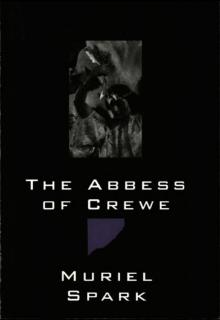 The Abbess of Crewe: A Modern Morality Tale
The Abbess of Crewe: A Modern Morality Tale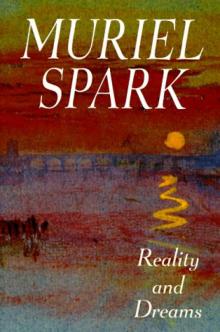 Reality and Dreams
Reality and Dreams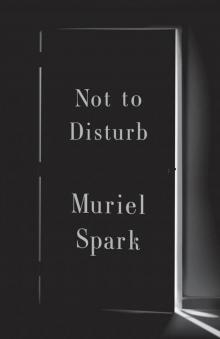 Not to Disturb
Not to Disturb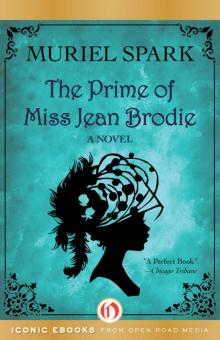 The Prime of Miss Jean Brodie
The Prime of Miss Jean Brodie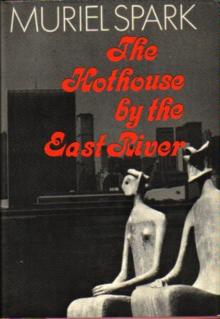 The Hothouse by the East River
The Hothouse by the East River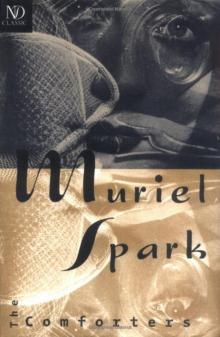 The Comforters
The Comforters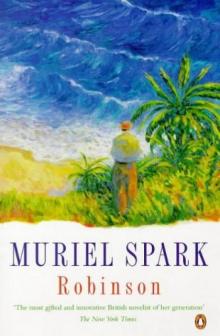 (1958) Robinson
(1958) Robinson Unknown
Unknown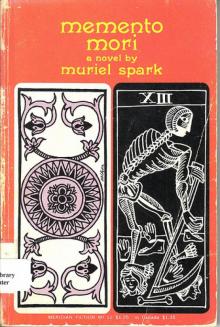 Memento Mori
Memento Mori The Finishing School
The Finishing School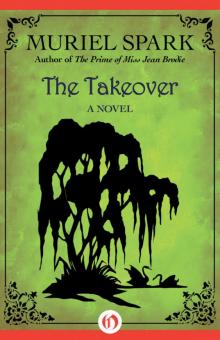 The Takeover
The Takeover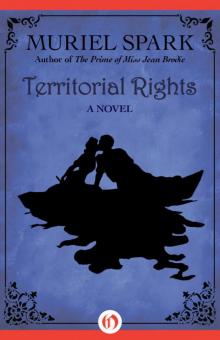 Territorial Rights
Territorial Rights The Complete Short Stories
The Complete Short Stories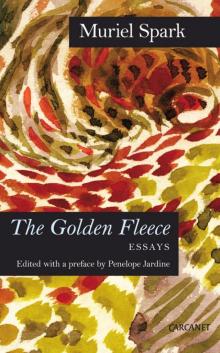 The Golden Fleece: Essays
The Golden Fleece: Essays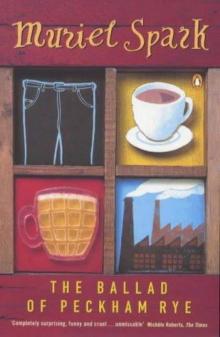 The Ballad of Peckham Rye
The Ballad of Peckham Rye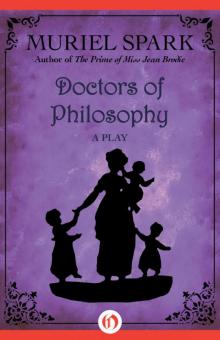 Doctors of Philosophy: A Play
Doctors of Philosophy: A Play The Mandelbaum Gate
The Mandelbaum Gate Loitering With Intent
Loitering With Intent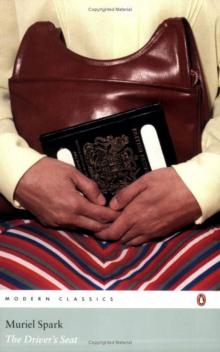 The Driver's Seat
The Driver's Seat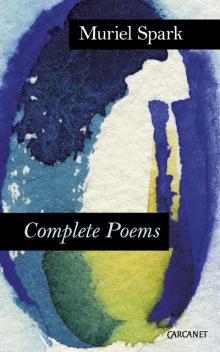 Complete Poems: Muriel Spark
Complete Poems: Muriel Spark Symposium
Symposium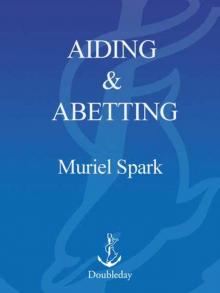 Aiding and Abetting
Aiding and Abetting The Golden Fleece
The Golden Fleece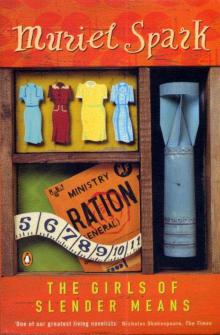 The Girls of Slender Means
The Girls of Slender Means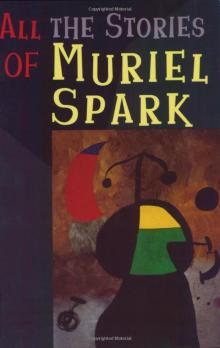 Alice Long’s Dachshunds
Alice Long’s Dachshunds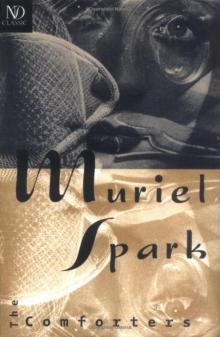 (1954) The Comforters
(1954) The Comforters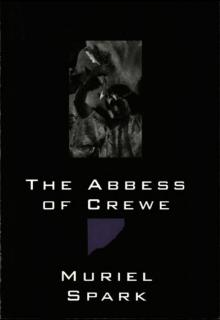 The Abbess of Crewe
The Abbess of Crewe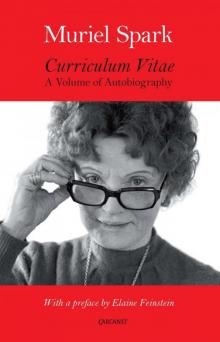 Curriculum Vitae
Curriculum Vitae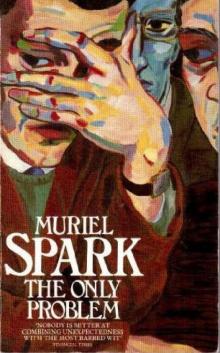 The Only Problem
The Only Problem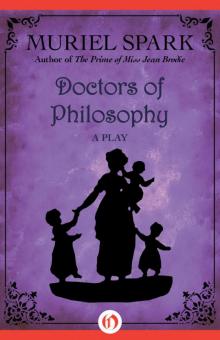 Doctors of Philosophy
Doctors of Philosophy